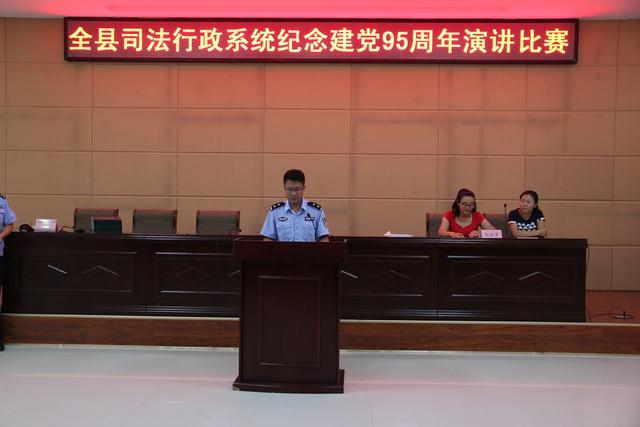
作文一:《演讲比赛 作文》2400字
演讲比赛? ?作文?
演讲?比赛? ?作文?
演讲?比赛? ?作文记?一次?演讲?比赛? ?
伴随?着习?习秋?风?,我们?迎来??了一年一?度的?演讲?比赛?。我?们陆?续走?进了??电教室?,只见??上空写着?四个?大字?:演?讲比?赛。?同学?们个?个喜?气洋?洋,?欢?笑声“?盖”?过了?音响?里放?出的?歌声?。演?讲比?赛就?这样?拉开?了帷?幕。? ?演讲?比赛?开始?了。?那迷?人的?声音?像磁?石一??样把我吸?引住?了。?第一?位演??讲的是庞?文博?她那?稚嫩?的声?音把?我们??仿佛带到?了美?妙的?童话?世界?里。??紧接着是?李文?月。??就这样一?个人?一个?人演?讲完?了,?很快?就轮?到我?了,??我慢悠悠?的走?上台?,心?里就?像揣?着一?只小?兔。?就像?自我?安慰?一样??,鼓?起勇气向?台上?走去?。? ?
我清了?清嗓?子,?大胆?的演?讲着??,我也不?知道??我演讲的?好不?好。?只是?演?讲完了?,就?只听?见有?几声?稀薄?的掌?声。?我从?心底?里知?道,?我演?讲的??的确不好?,下?台的?时候?,我?把头?弄的?低低?的,?时不?时的??看郝老师?一眼?,?只见郝?老师?用甜?甜的?微笑?向我?致意?,我??的心里终?于舒?展开?了。? ?很快?,演?讲比?赛进?行完?了,?开始?宣读?分数?了。?满分?是?10?分。就?在宣?读?分数时?,我?的心?就像?打翻?了五??味瓶,真?不是?滋味?!?最后,?我竟?然是?第?二名,?太不?可思?意了?!?我简直?都不?相信?我自??己的?耳朵了。??我还以为?只?是个参?与奖?呢?!颁完?奖后?,我?这才?相信?这是?真的?。? ?
演讲比?赛虽?然完?了,?但是?我心??里总燃着?一种??不灭之火?,这?火就?是前?进?之火,?奋斗?之火??,就是因?为这?种火?,本?来让?不自?信的?我,?有了?自信?和?奋?斗的勇气?。? ?
演讲比?赛结?束了?,但?是同?学们?还沉?浸在?刚才?情的?比赛?里???? 2.? ?
敬爱的?老师?,亲?爱的??同学们:? ?
大家好?!?在这风?和日?丽,?艳阳?高照?的日?子里?,我?们迎?来了?在小?学阶?段?的最后?一次?欢聚?。?
与身??边的校园?要挥?手告?别了?,纵?然,?有千?言万?语也??不能表达?我对?母校??的眷恋之?情。?相信?同学?们,?你们?的感?受也?与我?一样??吧。从入?学到?现在?,?我印象?最深?的便?是校?门口?的那?棵樱??树和边上?的那?棵小?树。?那小?树是?我?在一年?级时?亲眼?看到??门卫老伯?伯种?下的?,现?在,?它已?经增?添了?六个?年?
轮,而?樱树?则见?证了?它的?成长??。我们就?好比?是小?树,?而校?园是?樱树?,?不是吗?? ?
看着?眼前?校园?的一?切,?是那?么熟?悉,?不禁?又勾?起了?我的?回忆???? ?记得二?年级?的那?个“?六一?”儿??童节,学?校的?操场?仅有?如今?的三?分之??一,地面?不是?塑胶?而是?水泥??,由于拍?卖会?过于?拥挤?,我?被同?学挤?倒了?。?只听见?“嚓?”的??一声,我?跌倒??在了水泥?地上??,当我艰?难地?从地?上爬?起?来时,??发现左膝?上的?皮已?经磨?破,?血很?快流?了出?来,?我慢?慢地?向教?室?走去,?疼痛?继续?蔓延?着。?这时?,很?多同?学见?了说?:“?逗,?怎么?了??”“??哎呀,你?膝盖?磨破?了,?逗,?怎么?搞的?,给?,纸?巾,?先把?伤口?周围?的石??子擦掉吧?!”?“哦?,快?去卫?生室?!”?同学??们七嘴八?舌地?关切?地问?着我?。?后来,?我被?一群?好心?的同?x?学架着?胳膊?去了?卫生?室,?徐老?师仔?细地?帮?我清洗?伤口?,上?药水?,我?疼得?呲呀?咧嘴?地想?哭,?同学?的安?慰使?我忍?住?了泪水?。虽?然下?午不?能去?活动?了,?只能?留在?教室?里,?但我?的心?依然?是?充实的?、快?乐的?! ?
记得?一年?前的?拔河?比赛?,在?最终?的决?胜局??时,我们?第二?局败?给了?力量??悬殊的种?子队?选手?50?1?班。什??么?我们?失败?了,?这是?我们?三班?拔河?比?赛中遭?遇最?大的?挫折?,因?为,?我们?从未?被打?败过?,当?时的?局势?非常?的?紧张,?一比?一平?!?我们打?成了?平手?,最?后一?局定?胜负?!?我们一?开始??时毕?竟有些难?过,?导致?力量?有些?减退?,但?是一?想到?集体??的荣誉高?于一?切,??便再次信?心满?满,?精神?抖擞?地上?了“?战潮?“加?油,??加油!”?曹老?师带?领?着拉拉?队员?在一?旁为?我们?呐喊?助威?,我??们咬紧牙?关,?拼尽?了全?力,?好?!?绳子已经?在向?我们?这边?移动??了,幅度?越来?越大?了,?随着?裁判?一声?哨音?,?对方的?绳子?一松??,我们全?倒下?了。?“胜?利了?,胜?利了?!“?我们?躺在?地?上欢呼??:”“五?连冠?,五?连冠?!”?曹老?师更?是激?动得?满脸?通红?。是?的,??我们经过?一番?波折?最终?靠实?力再?次夺?魁?! ?
那套集?体舞??的服装,?我始?终把?它挂?在衣?柜最?显眼?的地?方,?因为?它见?证?了?集体舞全?校第?一的?成绩?! ?
小学?生活?的往?事历?历在?目,?每一?抹都?是我?们记?忆蓝??天中别具?一格?的云??彩。 ?
光阴荏?苒,?岁月?如梭?,我?们即?将告?别小?学的?师友?,迈?入中?学的?大门?,?告别童?年的?幼稚?与天?真,?走向?少年?的懂?事与?成熟?。?
敬爱?的老?师,?亲爱?的同?学们?,让?我们??拥住这珍?贵的?童年?,锁?住这??美好?
的情感,?珍藏?这永?久的?记忆?吧?! ?
谢谢?大家?! ?
?
?
作文二:《演讲比赛计划》1100字
关于“建设节约型社会”演讲比赛的策划书
演讲主题:“建设节约型社会”
活动目的:本次活动旨在在同学们中再掀节约的新高潮,加深对勤俭节约的认识、理解和体会。
一、时间安排:
1.赛前宣传:由承办方通过板报的形式对本次活动进行赛前宣传,做到宣传面广,宣传力度大。
2.初赛前的宣传通知,发布演讲比赛的相关规定和具体信息,组织学生报名参加比赛,并公布赛事进程和一些奖项设置。
3.赛前积极联系参赛选手,组织协调大家的出场顺序,并将赛场规定告知大家,望各位选手注意。
4.初赛:初赛时间待定,地点待定,希望大家认真准备、积极筹划。
5.公布进入复赛选手名单和复赛时间,鼓励大家积极准备。
6.复赛过后,公布进入决赛的选手名单,和决赛时间,并第一时间通知选手。
二、具体操作:
1.安排人员负责赛场的器材,每场演讲比赛器材组成员必须最少提前两个小时到达赛场,调试话筒,准备音响,并且保证赛场的音响正常工作,电路运行安全。
2.安排人员负责本次演讲比赛的宣传工作,包括广播宣传、海报、
展板等宣传工作。
3.安排人员负责本次演讲比赛的外联工作,处理和商家合作的赞助事宜。
4.安排人员负责各场演讲比赛的外事工作,包括邀请嘉宾、评委等,并担负动员选手、联系参赛选手、协调选手出场顺序等一系列工作。
三、参赛要求:
1.演讲作品要求:体裁不限、主题鲜明、观点新颖、文字简洁,具有较强的创新性、欣赏性和时代性,有一定的理论高度,能反映当代大学生积极向上的精神风貌和“勤俭、节约”的价值观和道德观。
2.表达形式新颖多样,有独创性,选手可以围绕主题畅谈自己的所见所闻,也可以根据个人思想,抒发自己的感想。
3.必须脱稿演讲,演讲过程中要求选手语言流畅、演讲技巧娴熟,具有较强的感染力。选手可以根据自己的需要在演讲过程中播放一些背景音乐;
4.时间限制:每位选手的演讲时间限时4—5分钟。 四、赛场具体流程:
1.主持人上场,宣布比赛开始,并介绍出席评委及嘉宾,宣布比赛要求及评分细则;
2.比赛开始,选手依抽签顺序开始演讲;
3.主持人宣布选手得分(前三名选手的得分在第四名选手演讲完后一起公布),第四名选手得分在第五名选手演讲完毕后公布,其他
依此类推;
4.嘉宾点评(其间有工作人员计算成绩,并进行排名,得出比赛结果);
5.主持人宣布晋级选手名单或获奖名单,并由领导颁奖。
五、奖品设置:
一等奖1名;二等奖2名;三等奖3名;优秀奖5名
作文三:《演讲比赛小结》1200字
演讲比赛小结
在这个秋风送爽的金秋时节。我们流通经济学院组织部代表流通经济学院举办了一场别开生面的演讲比赛。
一( 活动目的
丰富校园文化,生活。同时,举办这次聚焦2008演讲比赛,可以使大学生关注社会热点,并且增强当代大学生的爱国的自信心,自豪感。演讲是科学,是艺术,是展示个人文化素质修养的窗口。在院举办这次全院范围内的聚焦2008演讲比赛,让我们在兴趣中求知,在激烈中求识,展现当代大学生的综合素质;引导和激励大学生奋发有为,自觉成才,成为社会主义事业的合格建设者和接班人。 二( 活动主题
辉煌历程,伟大成就——聚焦2008
三( 活动内容
本次活动定于2008-10-16 18:30于教学楼2号楼130报告厅举办。 1) 前期准备
当演讲比赛定下时,我们就有条不紊地展开了准备工作。
召开班长会议,请班长对此次活动做好宣传工作,并推选优秀的
同学参加此次演讲比赛;组织我部干事开会,对于本次活动的策
划,流程进行详细的讨论,并且分配各自的工作。在流通经济学
院学生会的配合以及组织部所有成员的努力下,我部将前期准备
工作都稳妥的完成了。
2) 演讲比赛现场
演讲比赛开始之前,我部干部与干事就很早的来到了现场进
行会场布置。大家根据计划,有序的完成了自己分配到的任务。
比赛现场,同学们的积极性都很高。选手们的准备工作也很完善。
整个比赛有条不紊的进行。每个演讲结束,同学们都热情的鼓掌。
由于我部考虑到演讲比赛的枯燥性,还在此次比赛中增加了游戏
环节:疯狂主播,急速60秒,吹蜡烛。游戏不但与此次比赛主题
相呼应,还受到了大家的好评。同学们表现热情,全场的气氛也
恰到好处的得到了放松。
3) 后期安排
比赛结束后,我部干事自觉留下,按计划把会场清理干净。
四( 活动成果
无论就同学们的参与性还是活动效果而言,这都是一场成功的演讲比赛。活动中不但激发了同学们对于社会热点问题的关注,让“爱国之心”在校园中回荡,而且还促进了我部干事间的团结合作,锻炼了组织能力,我部干事都为使演讲比赛成功出了自己的一份力量。但是,在进行过程中,仍就存在着不少不足之处。首先,此次比赛中途,出现了现场秩序混乱,提醒我们下次活动应设立维持秩序的人员。其次,由于挂钩出现问题,导致比赛中途,中国结掉落。最后,由于个别选手对演讲这种形式不甚了解,所以造成了一些不足。我相信,在
下次演讲比赛中,我们会提前仔细阅览选手的演讲材料,以免造成不
必要的失误。
此次演讲在我们流通经济学院学生会的合作下顺利进行,使当今
大学生关注国家,社会热点问题。我们相信在我们不断地改进和努力
下,下一届演讲比赛将办得更好~
流通经济学院组织部
2008/10/26
作文四:《演讲比赛时间》600字
HCCS中文演讲比赛安排
演讲比赛时间:
初选:在各班进行,时间是四月十九日,利用上课时间。请老师们安排好你的教学; 复选:在学校范围内进行。时间是四月二十六日。参加者为各班评选出的前二(三)名。 演讲比赛内容:
学生可以自选内容,体裁。可以是名家名段,也可以是自写的作文、诗歌、故事等。可以是寓意深刻的寓言故事,也可以是自己的亲身经历,成长历程。可以是对自然现象的观察、描述,也可以是内在心灵的独白、思考。可以讲述中文学习的趣事和身边的朋友,也可以展开想象的翅膀畅游未来。内容不限。
演讲比赛方法:
参加者:凡一年级(含一年级)以上的学生都要参加。如果幼小、幼大班的学生也愿意参加,欢迎他们参加;
初选:初选以班级为单位在各班进行。每个学生的演讲应不超过三分钟。评选裁判由各班家长和老师共五人担任。每个老师聘请本班四位家长与相邻班的四位家长互换组成裁判组。互换班级的安排和评分方法请看稍后的通知。
初选获胜者:班级人数少于或等于十五人的选出两名优胜者,多于十五人的选出三名优胜者参加学校的决赛。
决赛:决赛裁判由2-3名教师和校委会成员,4-5名家长组成。每个学生不多于三分钟。选出十名优胜者为演讲比赛的获奖学生,并将在毕业典礼时发奖。决胜者的选择要适当考虑到学生的年龄分布。
各位老师,学生,家长请尽快开始演讲比赛的准备工作。希望通过演讲比赛,提高同学们阅读的兴趣和演讲水平。并预祝同学们取得好成绩。
多谢~
郭唯
EC OF HCCS
作文五:《演讲比赛技巧》2100字
演讲?比赛技巧??
演讲?准备?40?. ? ? ?不要指??望几分钟?的演?讲能?起到?翻天?覆地?的作?用。??用最自然?的方??式表述,?听来?要让?人思?考半?天才?能明?白的?词语?别用?,让??人费解或?可能?使人?误解?的观?点别?说;?41?. ? ? ?拿到演?讲稿?一定?要按?比赛??时的速率?试两?遍,?确保?不超?时,?千万?别存?侥幸?。?42.? ?? 对演?讲稿?尤其??是对?别人写的?稿子?要反?复读?,背?下来?只是?最低?要求?,你?必须??对稿件中??的每一个?标点?的由?来都?了然?于胸?;?43.? ? ?尽可?能的?预先?到演?讲场?地,??熟悉环境?设施?。如?有可?能不?妨到?台上?喊上?几嗓?子;?44?. ? ? ?搞清楚??是哪?些评委哪?些听?众;?45?. ? ? ?预先演?练好?如何?上下??场。几步?可以?到话?筒,??在哪儿鞠?躬;?46?. ? ? ?如果话?筒高?度不?合适?,主?办方?安排?专人?调整?的比??赛,应在?上台?前就?示意?工作?人员?调整?,如?无专?门人?员调??整,自己?应知??道如何调?整,?不可?胡乱?吹吹?打打?。?47.? ? ?如果?可以?看讲?稿的?比赛?,最??好不带讲?稿。?一定?要带?,记?住讲?稿最?好是?单面?打印?;?48.? ? ??练习用正??常语调、?最大?的音?量清?楚的?完成?演讲?;?49.? ? ?别指?望到?时变?腔变?调、??装猫变狗?吸引?人。?场前?准备?50?. ? ? ?举止务?求自?然;?51?. ? ?? 愉快地?接?受领队?教练?或亲?朋的?鼓励?;?52.? ? ?比赛?前一?夜睡?个好?觉;?53?. ? ? ?向?尽可?能多的听?众问?候,?包括?老朋?友,?也包?括新?面孔?,对?你在??赛前看到??的每一个?人微?笑;?比赛?时他?们会?还给?你最?宝贵??的鼓励;?54?. ? ? ?要象准??备对全世?界演?讲一?样准?备你?的演?讲;?55?. ? ? ?当你的?名字?被叫?到时??,慢?慢的站起?来,?以正?常的?步幅?走向?演讲?台;?56?. ?? ?想像一?下你?的恋?人或??你心仪已?久的?人就??坐在台下?;想?想你?的朋?友正?向你?欢呼?、想?想你?曾有??的成功;?57?. ? ? ?揽镜自?顾,?画眉?深浅?入时?无。?但这?里的??时应是演?讲比??赛的标准?;?58.? ? ?不要?穿戴?任何?花里?胡哨?的服?饰。?花边?类的?服饰?等会??
转移大家?对演?讲的?注意?力?59.? ? ?把服?装里?的东?西掏?空。?尤其?是可?能发??出声响的?手机?或可?能露?出来?的讲?稿等?等?60.? ? ?别试?着预?先准??备手势;?61?. ? ? ?放松面?部肌?肉,?让脸?上的?微笑?来自?内心?;?62.? ? ?别让?头发?垂?到脸上?;你?必须?给人?清爽?利落?的形?象;?63?. ? ? ?临演说?前可?以含?薄荷?味?或咖啡?质的?口香?糖。?但上?台前?三分?钟必?须吐?掉,?清空?你的?嘴巴?。?6?4. ? ?可以?做一?些深?呼吸?;?65.? ? ?自我?伸展?并想?像你?比实?际要?高,?正在?天空??翱翔,俯?视着?大地?的芸?芸众?生;?66?. ? ? ?如果你??的演讲被?安排?在午?后,??中午睡上?一觉?,会?给你?的精??神加分不??少;67?. ? ? ?场内正?比赛?,就?不要??还在会场?外的?走廊?或卫?生间?里背?稿子?;?68.?? ?要尽?可能?的多?听先?讲的??人演讲;?69?. ?? ?试着以?端坐?不动?的姿?势放?松?10?分钟。?比赛?之中?70?. ? ?
?相信:? ?
你是在?作最?一流?的演?讲。?你就?是大?家期?待的?一等?奖的?得主?;?71.? ? ?笑得?自然?;?72.? ? ?鞠躬?致意?――?站到?话筒?前―?―深?呼吸?――?放松?――??微笑――?开始?把烂?熟于?心的?讲稿?讲出?来;?73?. ? ? ?用目光?和观?众说?话,??先从那个?你感?到最?亲近??的人开始?,用?目光?告诉?他,?你感?谢他?的关?注;??然后?,把所有?的听?众都?当成?你的?大哥?大姐?。?74.? ? ?不要?忘了?用你?的目??光和表情?让评?委们?感觉?他很?重要?;?75.? ? ?可以?用长?停顿?,但?以不??让人?误解为忘?词为?界;?76?. ? ? ?对场内?听众?的噪?音点?可用?目光?恳求?他们?停止?,如?果无?效,?抬起?你的?目光?,不?去管?他,?继续?你的?演讲?。?77.?? ?最后??的那句我?的演?讲结?束了?或谢?谢,?万不??可说得随?意,?草草?首场?。它?是你??演讲中重?要的?台词??。演讲比?赛技?巧?
?
作文六:《作文 演讲比赛》1800字
作文 演讲比赛
作文 演讲比赛
作文 演讲比赛三月,一个多么美妙的季节呀!也是我们的学雷锋月,在三月,人们都在行动,我们学校也不例外,这不,马上就要开始关于学习雷锋的演讲比赛。
“呤??”这时紧张而欢快的铃声响了,我们迅速地搬着自己的凳子,整整齐齐地坐在了教室前的水泥场上。
这时,学校领导把参赛选手的名字念了一遍,我班的两位选手是万梦和李丹,她们可是老师千挑百挑的选出来的,可见她们的能力非同一般呀!在比赛前,二位同学就在全班同学面前演讲过。 接着是抽签,她们俩还算好,抽的数字不前不后,是9号和12号。第一位是一班的一个倒霉的男生,不知是他紧张还是什么其他原因,他演讲的糟糕透了。接下来的几位还演讲的不错,但给我印象最深的是一班的刘敏,她带着微笑站在台上,全场就像平静的水面一样。 “春天??”一句句话好似美妙的音符,丁冬丁冬悦耳地奏出来。同学们都睁大了眼睛,场上静悄悄的,大家都屏住了呼吸听下面的。 她从容不迫,感情真挚地朗诵着,脸上泛起激动的红晕。听到她的朗诵,她班的同学都为她高兴的笑了。
虽然她读得很好,但我班的同学却不服,到我班的李丹读的时候,我班都竖起耳朵听,可是,由于她离话筒太远,所以声音让别人听起来特校当时,我班的同学都恨不得把话筒往她面前拿一截。可是这只能空想,渐渐的,李丹的耳朵和脸渐渐地红了起来,我想她肯定是很紧张的原因才红的吧!
哎,李丹失败了。我班的希望全都寄托在了万梦身上。到了万梦演讲时,她也犯了和李丹一样的毛勃—声音校
显然的,我们班失败了,但我们班的同学却没有一点失去信心的表情,我们仍然相信下一次胜利是属于我们的。
5月9日是母亲节,我们班在教室里举行了作文演讲比赛,这是一次难忘的比赛,更是一次让我自豪的比赛。
我参加了这次比赛,在抽签的时候,我激动极了。小心翼翼地打开纸条,我惊奇地发现我是最后一个。我真的不是很高兴,因为要等很久
很久。不过妈妈安慰我说:“好节目不都在最后吗?”可是我说:“不可能!一定是王雨萌第一,她经常是第一的!”妈妈说要有信心,也有可能是我呢!
因为参加了别的活动,我没有很多时间准备,练习背诵的时候也总是漏这漏那,那天晚上还练哭了呢。
比赛开始了,我细心地听着前面同学的演讲。让我印象最深的是温清华,她的作文很感人,但如果速度再放慢些,就更好了。我当时在心里暗暗地告诉自己:上台时一定要大胆,不要着急,还要有感情。 终于排到我了,我的心怦怦直跳地上了讲台,好像这个我天天上课的课室变得陌生了。观众席上坐满了家长,正准备给我打分呢。我好害怕,怕自己说错了一个字。
当听到卢老师放了一首好听的歌给我配音时,我的情绪渐渐稳定了,也不那么紧张了。在最后的那几句中,我把自己都感动得快哭了。那时我觉得我已经不是为了拿第一了,而是想在这母亲节的时候,把我的作文——《妈妈的爱在每一天》送给我的妈妈,送给全班的妈妈,送给天下的妈妈。
最后结果出来了,正象我妈妈说的我得了一等奖。啊!我真快乐,这次比赛给了我多大的享受啊!
老师评语:我们常说,把“真实”还给作文!钟滢,你的作文又写成功了!
你生动地记叙了作文演讲比赛活动当天的情况,尤其是当时的心理描写,好极了!
那天你真挚的童言、真实的情感打动了每一个人!继续努力! 妈妈的话:钟滢的这篇作文终于拿到了她一直想拿的A++,老师在作文里划了好多波浪线还不时地在边上点评心理活动的句子。这些无形地激励着钟滢写作的热情,还有对自己的肯定。
在这文章里我最欣赏的是最后两段。倒算第二段的心理描写让我看到孩子已经能不自觉地练习放下“小我”成就“大我”,不再为了争第一而是为了真心地给天下的妈妈送上一份爱的礼物。还跟我说这“天下的妈妈”不只是说人类的妈妈还有动物和植物的妈妈。 曾经不时地告诉她在关健的时刻要学会放松、看淡,特别是在比赛的
时候,比的就是心理素质,越紧张越失误。就象伸手去抓一把沙子,如果紧紧地抓住越抓越少,如果放松了,捧起来的时候最多。 最后一段跟我说其实她知道自己总分第一时高兴得真想跳起来,但不能太张扬、太骄傲,要不没有人喜欢你的,所以只能写两句不能写得太疯了。
我笑着问:“卢老师当时问谁觉得自己第一名?你敢不敢举手说自己第一?”
“我就是第一也不会上去说自己第一。”
“说自己第一有什么不好?”
“没有不好,我不想这样做。”
孩子慢慢地知道内敛了,有时还比我内敛,让我觉得很欣慰。
作文七:《globalization 演讲比赛》19900字
第十届“21世纪杯”全国英语演讲比赛亚军——张京
The Impact of Globalization on Traditional Chinese Values
Good morning, ladies and gentlemen:
Before western and Chinese civilization came into close contact, Chinese people had always longed for a life depicted in traditional Chinese paintings. Those paintings present a harmonious coexistence of people and other life forms. Regarded as the essence of ancient Chinese philosophies, harmony has been deeply-rooted in the minds of the Chinese people. On the one hand, it has contributed to the unique continuity of Chinese civilization. On the other, Chinese people became too much contented with their achievements to desire any further changes. As globalization deepens, it is bound to affect our ideal of harmony.
First, globalization urges China to speed up its modernization, which threatens our regard for the harmony between Man and Nature. For instance, many dams and hydropower stations are being built for economic benefits at the expense of the well-preserved natural habitats. However, ecological malpractice of such kind goes against the notion of harmonious coexistence in ancient Chinese philosophies. More than 2,000 years ago, long before the concept of environmental protection came into being, DuJiang Weir, a great irrigation project was built in southwestern China's Sichuan province. It succeeded both in controlling floods and in facilitating the agriculture without posing a threat to the environment.
Moreover, globalization has brought with it intense petition. Traditionally, moderation is a golden principle, presiding over inter-personal relations in China. Today, however, motivated to e to the top, some people bee so self-centered that they choose to sacrifice love, friendship and even family ties.
Last but not least, diverse cultures have met in China as a consequence of globalization. Therefore, a clash of cultures bees inevitable. Unfortunately, the past decades have witnessed a huge loss of cultural heritage in China. In cities like Beijing and Xi'an, hundreds of c entury-old Chinese-style houses are being demolished to make room for skyscrapers, shopping malls and eight-lane expressways.
From these examples, we see the disharmony brought about by globalization. Y et it is not globalization that is to blame. As long as we approach globalization with harmony in mind, its benefit will outweigh its cost. Take my hometown, Hangzhou, for example, thanks to the strenuous efforts made by the municipal government in achieving eco-development, various water birds have returned to the West Lake, calling it home again after years of migration elsewhere. From the lake bank, we see skateboarders and trick cyclists showing off together with people flying kites and kicking shuttlecocks on the plaza nearby. Although they pose a picture quite distinct from traditional Chinese paintings, this picture conveys a modern sense of harmony in this era of globalization.
Ladies and gentlemen, to conclude, I would like to quote from British philosopher Bertrand Russell. In contrasting Chinese and Western civilizations, he observed: "The distinctive merit of western civilization is the scientific method; the distinctive merit of the Chinese is a just
conception of the ends of life. It is these two that one must hope to see gradually uniting." As we see the tremendous progress China has been making drawing on experience abroad, we may also expect the Chinese traditional value of harmony to enrich the world. I look forward to the time when Russell's prophecy es true.
Thank you very much.
第十届21世纪杯全国英语演讲比赛冠军——夏鹏
Thank you ladies and gentlemen. My topic today is "Walls and Bridges".
I'm studying in a city famous for its city walls.
All visitors to my city are amazed by the imposing sight of the city walls, silhouetted by the setting sun with gold and shining lines. With old cracked bricks patched with lichen, the walls are weather-beaten guards, standing still for centuries in protecting the city.
Our ancestors liked to build walls. They built walls in Beijing, Xi’an, Nanjing and many othe r cities, and they built the Great wall which snakes through half of our country.
They built walls to ward off the enemies and evil spirits.
This tradition has been maintained to this day as we still have many schools and parks walled off from the public.
I grew up at the foot of the city walls, and I have been loving them since my childhood.
For a long time, walls were one of the most natural things in the world. My perception, however, changed after a hiking trip to the Eastern Suburbs, a scenic area of my city.
My classmates and I were walking with some international students.
As we walked out of the city, we found ourselves flanked by taller and taller trees which formed a huge canopy above our heads.
Suddenly an international student asked me, “where is the entrance to the Eastern Suburbs?” “We’re already in the Eastern Suburbs,” I replied. He seemed taken aback.
“I thought you Chinese have walls for everything.” His remark set off a heated debate.
At one point, he likened our walled cities to “jails”, while I insisted that the Eastern Suburbs was one of the many places in China that had no walls.
That debate had no winners, but I did learn a lot from this international student.
For instance, he told me universities like oxford and Cambridge were not surrounded by walls, the campuses were just a part of the cities.
I have to admit that we do have many walls in china, and as we are developing our country, we must carefully examine them, whether they are physical or intangible.
We will tear down some walls, and we will keep some of them. Let me give you an example. A year ago, when I was working on a term paper, I needed a book on business law and found a copy in the law school library.
However, the library turned down my request with a cold shoulder, saying “you can’t borrow this book.
Y ou are not a student here.” In the end, I had to spend 200 yuan buying a copy, meanwhile, the copy in law school was gathering dust on the shelf. At the beginning of this semester, I heard that my university had started not only to unify all its libraries but also to link them up with libraries of other universities, so my experience will not be repeated. Barriers will be replaced by bridges.
Through an inter-library loan system, we will have access to books from any library. With globalization, with china integrates into the world, I believe many of these intangible walls will be knocked down.
I know globalization is a controversial issue, and it’s hard for us to say whether it is good or bad. But one thing for sure, it draws our attention to china’s physical and intangible walls and force us to examine their in the modern world.
Then what about the walls in my city and other cities? Should we tear them down? Just the opposite. My city, like Beijing and other cities, is actually making a great effort to preserve the walls.
These walls now attract not only historians and archeologists, but also schoolchildren trying to study our history and cultural heritage. The walls have turned into bridges to our past and to the rest of the world.
If the ancient builders of these walls were still alive today, they would be proud to see such a great change in the roles of their walls.
They are now cultural bridges that link East and West, South and North and all the countries of the world.
Our cultural heritage will survive globalization. Thank you very much ladies and gentlemen.
主题: 第十届“21世纪杯”全国英语演讲比赛冠军演讲稿
Thirty college students across the country attended the Tenth 21st Century Cup National English Speaking Contest in Beijing on April 10. Eventually, Xia Peng, from Nanjing University was named the champion. The second and third places t to Zhang Jing, a sophomore from China Foreign Affairs University, and Zhang A Xu, from Hong Kong Polytechnic University, respectively. More than 1000 college students in Beijing are lucky birds to listen to the speeches on the spot in Friendship Hotel.
Just make to it the finals, they had to get past 60 others speaking on “The impact of globalization on traditional Chinese values”. That was at the semi-final on April 8-9. What will Chinese college students think about the impact? Each contestant had his own take on the subject. Xia summed up globalization by saying: “It ’s just controversial and hard to say whether it is good or bad.” Xia took the old wall of his city, Nanjing, as a metaphor. He spoke about the conflict over whether to protect the old walls or tear them down to represent the conflict of ideas. He suggested that people protect the wall as a valuable relic while tearing down the “intangible walls” of their minds that prevent munication. While some other students are more focusing on the impact of globalization on family relations, attitudes towards love, and job-hunting.
Over the past 10 years, the national English speaking petition has given contestants a chance to speak on a variety of topics closely related to their lives. Chinese students bee more open-minded and receive various ideas and thinking over the decade. Diversity bees more obvious on campus, students have more opportunities to express and show themselves. It’s not an easy task for the contestants to win through the fierce petition. Owning to their passion, hard work and persistence, they finally succeeded in the contest.
Liu Xin, the first champion of the national contest, is now an anchorperson of CCTV-9. Recalling the passion of study on campus, she said: “When you want to express your idea by a foreign language without finding a right way, you’re really upset. Then you have to encourage yourself, and after a long term of bitterness, suddenly you find you get the right way with joy.” With the champion
title in 21st Century Cup, Liu attended the International Public Speaking petition in London in May 1996 afterward and got the first prize historically.
The winner in 2003 surprised the audience, since she came from accounting major instead of English major. Gu Qiubei, then 22 years old, was a senior in Shanghai Foreign Studies University. While being asked whether she had some good methods to learn English, she said: “Learn English with passion and enthusiasm.” Attracted by the greatness of English language, Gu even changed her major from accounting to English in her postgraduate study. The most important issue in English learning process she pointed out is personal interests. Only people interested in English benefit a lot from the learning methods and those with passion will finally achieve their dreams.
When chief of global media giant Via Sumner Redstone gave a speech in Tsinghua University on his autobiography A Passion to Win, he was asked what made him to restart his career at the age of 60, the 81-year-old media tycoon said: “Firstly, there’s a self-driving force in my deep heart, which keeps my passion to succeed and surpass others; secondly, I don ’t think I ’m too old to leave work, actually I love my work very much.”
Some of the contestants have achieved their dreams as Redstone; still others are on the way to their dream. With a passion to win, you will overe obstacles and succeed at the end.
By the first prize winner, Xia Peng, Nanjing University:
第十届“21世纪杯”全国英语演讲比赛冠军演讲稿
Building Bridges for the Future
I ’m studying in a city that’s famous for its walls. People who visit my city are amazed at the imposing sight of its walls, especially when silhouetted against the setting sun with gold, shining streaks. The old, cracked bricks are covered with lichens and the walls are weather-beaten guards standing still for centuries.
Our ancestors liked to build walls. They built walls in Beijing, Xi’
an, Nanjing and many other cities, and they built the Great Wall, which snakes across half our country. They built walls to protect against enemies and evil spirits. This tradition has survived to this day: we still have many parks and schools walled off from the public.
For a long time, walls were one of the most natural things in the world to me.
My perceptions, however, changed after I made a hiking trip to the eastern suburbs of my city. My classmates and I were walking with some foreign students. As we walked out of the city, we found ourselves flanked by tall trees, which formed a wide canopy above our heads. Suddenly one foreign student asked me, “Where is the entrance to the eastern suburbs?”
“We ’re already in the eastern suburbs,” I replied. He seemed taken aback, “I thought you Chinese had walls for everything.” His remark set off a heated debate. At one point, he likened our walled cities to “jails ”, while I insisted that the eastern suburbs were one of the many places in China that had no walls.
That debate had no winners, but I did learn a lot from this student. For instance, he told me that some major universities like Oxford and Cambridge were not surrounded by walls. I have to admit that we do have many walls in China, and as we develop our country, we must look carefully at them and decide whether they are physical or intangible. We will keep some walls but tear down those that impede our development.
Let me give another example.
A year ago, when I was working on a term paper, I needed a book on business law and found a copy in the law school library. However, the librarian coldly rejected my request to borrow it, saying, “You can ’t borrow this book, you’re not a student here.” In the end, I had to spend 200 yuan to buy a copy. Meanwhile, the copy in the law school gathered dust on the shelf.
At the beginning of this semester, I heard that my university had
started to think of unifying its libraries and linking them to libraries at other universities, so my experience wouldn’t be repeated. Barriers would be replaced by bridges. An inter-library loan system would give us access to books from any library. With globalization and China integrated into the world, I believe many of these intangible walls will be knocked down.
I know that globalization is a controversial issue, and it is hard to say whether it is good or bad. But one thing is for sure: it draws our attention to China’s tangible and intangible walls and forces us to examine their role in the modern world.
And how about the ancient walls of mine and other cities? Should we tear them down? Definitely not. My city, like Beijing and other cities, is actually making a great effort to preserve the walls. These walls attract historians, archaeologists, and many schoolchildren who are trying to study our history and cultural heritage. Walls have bee bridges to our past and to the rest of the world. If the ancient builders of these walls were still alive today, they would be proud to see such great changes in the role of their walls. They are now bridges that link East and West, South and North, and all countries of the world. Our cultural heritage will survive globalization.
赢的激情--记英语演讲比赛的获奖者们
4月10日,来自全国各地高校的30位大学生齐聚北京,参加了第十届21世纪杯全国英语演讲比赛。最终,来自南京大学的夏鹏获得了比赛的冠军。第二名和第三名分别被来自中国外交学院的张京和来自香港理工大学的张阿旭获得。在北京的1,000多名大学生有幸到友谊宾馆观看了现场的比赛。
在4月8-9日的半决赛中,这些选手淘汰了其他60名选手,最终进入了总决赛。演讲的主题是“全球化对中国传统价值观的影响”。中
国的大学生对这种影响有哪些看法呢?每位选手对这个问题都有自己的看法。对于全球化,夏鹏总结说:“这个问题充满了争议,很难说它到底是好还是坏。”夏鹏拿他的家乡——南京的古城墙来作比喻。他通过谈论保护与拆毁古城墙之间的矛盾,显示了这两种观念之间的冲突。他认为人们应该将古城墙作为珍贵的遗产进行保护,同时要拆掉心中妨碍沟通的那堵“无形的墙”。而有的选手则更加关注全球化对家庭成员的关系、对待爱情的观点,以及求职等方面的影响。
在过去的10年里,全国英语演讲比赛为参赛选手提供了畅所欲言的机会,使他们可以对与生活息息相关的各种问题发表自己的观点。中国学生的思想更加开放,他们接受了各种思想,对时代进行思考。校园里的多元化愈加明显,学生也有更多的机会表达和展示自己。众多选手要在如此激烈的竞争中胜出并非易事。凭借自己的热情、努力和毅力,他们最终在比赛中胜出。
刘欣是第一届全国比赛的冠军,现在是中央电视台国际频道的一位新闻节目主持人。在回忆校园学习的热情时,她说:“当你希望用一种外语表达自己的想法,却找不到正确的方式时,你会非常心烦意乱。这时,你要不断给自己打气,经过一段时间的努力之后,你会突然发现自己找到了正确的方式。”在获得21世纪杯英语演讲比赛冠军之后,刘欣又参加了1996年5月份的伦敦国际演讲比赛,并历史性的获得了冠军。
2003年的冠军却让观众大吃一惊,因为她学的是会计专业,而非英语专业。当时22岁的顾秋蓓是上海外国语大学的一名大四学生。当
被问及她有什么学习英语的好方法时,她说:“学习英语要有激情和积极性。”顾秋蓓被英语这门语言的魅力所吸引,她甚至将自己的研究生专业从会计转到了英语专业。她指出在英语学习过程中关键问题是个人的兴趣。只有对英语感兴趣的人才能从学习方法中受益,也只有那些对英语有热情的人才能最终实现自己的梦想。
全球媒体巨头维亚康姆的总裁雷石东在清华大学为他的自传《赢的激情》发表演说时,有人问他是什么动力驱使他在接近60岁的高龄,进行再次创业的?这位81岁的媒体巨头表示:“首先,我这个人内心向来有一种自我驱动力。它促使我不断地挑战自我,保持积极取胜、超越别人的激情。第二,我觉得我的心态根本没有老,我非常喜爱我从事的工作。”
其中有些参赛者像雷石东一样实现了他们的梦想,其他人也正在追寻自己的梦想。拥有赢的激情,你就能克服困难,最终取得成功!(编译:李强)
第十届“21世纪杯”全国英语演讲比赛一等奖——欧阳琪
欧阳琪
中国传媒大学
Restoration of Traditional Values in the Tide of Globalization
Good afternoon, ladies and gentlemen:
Today , an invisible yet powerful hand seems to be breaking the boundaries of every conceivable kind to integrate the world, from the flow of capital to the spread of information and to the exchange of ideas. Double-mint chewing gum can be found in remote areas in China; the Iraq war bees hot TV viewing on millions of screens; the relief effort of the recent tsunami has been participated in by nations worldwide...What else in our lives is being globalized? Finance, entertainment and health, to mention just a few.
As globalization bees so pervasive, I begin to wonder what will happen to our traditional values. Will it be strengthened in the process or the other way around?
As the market-driven economy gains its popularity worldwide, we have plunged ourselves into the pursuit of economic development and material gains. Just 20 years ago in China, in people's wildest dreams, who would even think of having a private car? However, as we celebrate these economic miracles, we can never ignore the negative impact. We have seen a dangerous trend that pushes us to a consumerist culture and a loss of identity . Y oung people celebrate Christmas and V alentines Day enthusiastically, while our traditional Dragon Boat Festival was nearly taken away by South Korea. English education is being such a huge industry , while our mother tongue seems to be put in a second place. We lock ourselves in this newly affordable high-rise apartment, when neighbors just mean strangers. And life can bee a game, as the so-called Fun Morality grabs us: we do not believe in the future; we believe in immediate gratification. We do not trust others; we keep to ourselves. We see ourselves as the center; we see everything else as tool to achieve our goals. We are doomed ifwe go down this route, because if we let the fear of poverty , the fear of losing the new found wealth govern our lives, then we will be able to eat, but we will not be able to live.
Ladies and gentlemen, I'm not a pessimist of globalization in pointing out these threats. In fact I believe all the negative impact will have a reverse power to restore our traditional values. Because values are not dead, they are dynamic. And since our minds are being more open, tolerant and diverse in the age of globalization, we can get a better idea of what are the good values that really deserve to last.
I'm glad to notice that the signs of the restoration of our traditional values are already emerging. Recently CCTV gave awards to 10 people, whose dedication to society have moved the Chinese people. There is a college graduate who devotes himself to kids in poverty-stricken areas in Guizhou; there is a doctor who brought warmth and hope to Henan AIDS patients. These very 10 people represent the many mon people around us, who may not have ambitious goals, but who are people who have faith in society, who cherish their families, who care about monwealth, and who love the country passionately. They are adopting the traditional values to the new global context.
The plexity of globalization can be described by Charles Dickens's words, "It was the best of times; it was the worst of times. It was the age of wisdom; it was the age of foolishness." Not only China, but also the world is facing a critical turning point. Globalization is enabling us to build the modem-day 4 )Tower Of Babel. Peace and development has bee the theme of the century . However, the restoration of our traditional values is the backbone of that theme. If we are to add our own contribution to the global values, then we'd better first look into ourselves and have a firm grip of what we shouldn't lose.
Thank you very much.
作文八:《演讲比赛主题》3600字
演讲比赛主题
演讲比赛主题
演讲比赛主题题解:当今社会被称为“信息爆炸”的时代,各种不同的价值观和生活理念通过不同的传播形式充
斥在我们身边,良莠不齐。大学生正处于世界观、人生观形成的关键时期,生活物质条件的不断改善,既提高了大学生的物质生活水平,但同时也在校园中产生了一些不良反应,有些大学生片面追求个人利益、无视中华民族的传统美德、缺乏远大的理想和信念??“八荣八耻”的提出,在大学校园内引起了强烈反响,不但对于增强爱国主义精神提出了指导思想,还对大学生的待人接物、文明礼仪等日常生活提出了规范标准,无不说明大学生树立正确的荣辱观的重要性和紧迫性。如何从自身做起,从小事做起,提高自身修养,展示当代大学生自强不息的精神面貌,成为我们需要深深思考的问题。请根据以上主题,结合亲身经历,畅谈自己的体会与感想。
-
一句句真实的体会,一声声发自肺腑的呐喊,一阵阵激-情热烈的掌声不断地从威海校区G楼202传出,12月11晚,由于“立足新起点 创造新业绩”十七大主题演讲比赛决赛的举办而人潮涌动热闹非凡,犹如我们工大学子学习十七大精神的“热焰”浓浓燃烧?? 演讲会场的外面,一排排贴满精心选出的党团报的宣传板让前来观看比赛的人们还未进入会场就感受到了同学们学习十七大精神的高昂劲头。一张张党团报色彩绚丽,设计新颖,内容充实,摆在大厅里煞是引人注目,吸引人们驻足浏览。
“同晖而起 龙舞九天”、“金秋盛会 巨龙腾飞”、“长风破浪 直挂云帆”、“十七大为中国擎起新希望”、“关注民生 共建和-谐社会”、“科学发展 我们再创新辉煌”??
民生、文化、和-谐、民族产业??全方位,多角度,演讲者们紧扣十七大精神主题,有的气势磅礴,有的娓娓道来,有的旁征博引,有的饱含深情;演讲者们理论联系实际,有感而发,他们将个人理想与国家理想相结合,流畅且富有感染力的演讲中有他们学习十七大精神的切身体会,有他们对党的新政策新动向的深刻理解,更有十七大精
神对他们自身成长成才定位的影响??演讲者们将自己学习十七大精神的心得和体会,作了一次激-情洋溢的阐述,他们的声音也是时而柔和温润,时而慷慨激昂、掷地有声,仪表举止也是端庄优美,声情并茂,神采飞扬,举手投足间无不吸引着同学们敬佩眼光的追随。一等奖获得者是来自汽车工程学院的牛尧飞和光电科学系的谭琛,他们感人的事例、深切的体会以及精彩的演讲更是得到了在场观众的热烈共鸣。
演讲结束后,威海校区纪委书记高学敏作点评。他连用几个“漂亮”来描述自己的感受。他夸赞场外宣传报漂亮、在场观众漂亮、选手们更是漂亮!他对本次演讲比赛给予了充分肯定,对同学们能够将十七大精神印入头脑,并这样完美地表达出来的表现更是连连夸赞。【扩展阅读篇】
演讲稿又叫演说词,它是在大会上或其他公开场合发表个人的观点、见解和主张的文稿。演讲稿的好坏直接决
定了演讲的成功与失败。
演讲稿像议论文一样论点鲜明、逻辑性强,但它又不是一般的议论文。它是一种带有宣传性和鼓动性的应用文体,经常使用各种修辞手法和艺术手法,具有较强的感染力。
演讲未必都使用演讲稿,不少著名的演讲都是即兴之作,由别人经过记录流传开来的。但重要的演讲最好还是事先准备好演讲稿,因为演讲稿至少有两个方面的作用:其一,通过对思路的精心梳理,对材料的精心组织,使演讲内容更加深刻和富有条理。其二,可帮助演讲者消除临场紧张、恐惧的心理,增强演讲者的自信心。
演讲稿特点
主要区别
演讲和表演、作文有很大的区别。
首先,演讲是演讲者就人们普遍关注的某种有意义的事物或问题,通过口头语言面对一定场合的听众,直接发表意
见的一种社会活动。
其次,作文是作者通过文章向读者单方面的输出信息,演讲则是演讲者在现场与听众双向交流信息。严格地讲,演讲是演讲者与听众、听
众与听众的三角信息交流,演讲者不能以传达自己的思想和情感、情绪为满足,他必须能控制住自己与听众、听众与听众情绪的应和与交流。所以,为演讲准备的稿子就具有以下三个特点:
主要特点
第一、针对性。演讲是一种社会活动,是用于公众场合的宣传形式。它为了以思想、感情、事例和理论来晓喻听众,打动听众,“征服”群众,必须要有现实的针对性。所谓针对性,首先是作者提出的问题是听众所关心的问题,评论和论辨要有雄辩的逻辑力量,要能为听众所接受并心悦诚服,这样,才能起到应有的社会效果;其次是要懂得听众有不同的对象 和不同的层次,而“公众场合”也有不同的类型,如党团集会、专业性会议、服务性俱乐部、 学校、社会团体、宗教团体、各类竞赛场合,写作时要根据不同场合和不同对象,为听众设计不同的演讲内容。
第二、可讲性。演讲的本质在于“讲”,而不在于“演”,它以“讲”为主、以“演”为辅。由于演讲要诉诸口头,拟稿时必须以易说能讲为前提。如果说,有些文章和作品主要通过阅读欣赏,领略其中意义和情味,那么,演讲稿的要求则是“上口入耳”。一篇好的演讲稿对演讲者来说要可讲;对听讲者来说应好听。因此,演讲稿写成之后,作者最好能通过试讲或默念加以检查,凡是讲不顺口或听不清楚之处,均应修改与调整。
第三、鼓动性。演讲是一门艺术。好的演讲自有一种激发听众情绪、赢得好感的鼓动性。要做到这一点,首先要依靠演讲稿思想内容的丰富、深刻,见解精辟,有独到之处,发人深思,语言表达要形象、生动,富有感染力。如果演讲稿写得平淡无味,毫无新意,即使在现场“演”得再卖力,效果也不会好,甚至相反。
第四、整体性演讲稿并不能独立地完成演讲任务,它只是演讲的一个文字依据,是整个演讲活动的一个组成部分。演讲主体、听众对象、特定的时空条件,共同构成了演讲活动的整体。撰写演讲稿时,不能将它从整体中剥离出来。为此,演讲稿的撰写要注意以下几个方面: 首先,要根据听众的文化层次、工作性质、生存环境、品位修养、爱好愿望来确立选题,选择表达方式,以便更好地沟通。
其次,演讲稿不仅要充分体现演讲者独到、深刻的观点和见解,而且还要对声调的高低、语速的快慢、体态语的运用进行设计并加以注释,以达到最佳的传播效果。
另外,还要考虑演讲的时间、空间、现场氛围等因素,以强化演讲的现场效果。
第五、口语性
口语性是演讲稿区别于其他书面表达文章和会议文书的重要方面。书面性文章无需多说,其他会议文书如大会工作报告、领导讲话稿等,并不太讲究口语性,虽然由某一领导在台上宣读,但听众手中一般也有一份印制好的讲稿,一边听讲一边阅读,不会有什么听不明白的地方。演讲稿就不同了,它有较多的即兴发挥,不可能事先印好讲稿发给听众。为此,演讲稿必须讲究“上口”和“入耳”。所谓上口,就是讲起来通达流利。所谓入耳,就是听起来非常顺畅,没有什么语言障碍,不会发生曲解。具体要做到:
把长句改成适听的短句;
把倒装句改为常规句;
把听不明白的文言词语、成语加以改换或删去;
把单音节词换成双音节词;
把生僻的词换成常用的词;
把容易误听的词换成不易误听的词。
这样,才能保证讲起来朗朗上口,听起来清楚明白。
第六、临场性
演讲活动是演讲者与听众面对面的一种交流和沟通。听众会对演讲内容及时作出反应:或表示赞同,或表示反对,或饶有兴趣,或无动于衷。演讲者对听众的各种反映不能置之不顾,因此,写演讲稿时,要充分考虑它的临场性,在保证内容完整的前提下,要注意留有伸缩的余地。要充分考虑到演讲时可能出现的种种问题,以及应付各种情况的对策。总之,演讲稿要具有弹性,要体现出必要的控场技巧。 主要功能
第一、“使人知”演讲。这是一种以传达信息、阐明事理为主要功能的演讲。它的目的在于使人知道、明白。如美学家朱光潜的演讲《谈
作文》,讲了作文前的准备、文章体裁、构思、选材等,使听众明白了作文的基本知识。它的特点是知识性强,语言准确。 第二、“使人信”演讲。这种演讲的主要目的是使人信赖、相信。它从“使人知”演讲发展而来。如恽代英的演讲《怎样才是好人》,不仅告知人们哪些人不是好人,也提出了三条衡量好人的标准,通过一系列的道理论述,改变了人们以往的旧观念。它的特点是观点独到、正确,论据翔实、确凿,论证合理、严密。
第三、“使人激”演讲。这种演讲意在使听众激动起来,在思想感情上与你产生共鸣,从而欢呼、雀跃。如美国黑人运动领袖马丁.路德.金的《在林肯纪念堂前的演说》,用他的几个“梦想”激发广大的黑人听众的自尊感、自强感,激励他们为“生而平等”而奋斗。 第四、“使人动”演讲。这比“使人激”演讲进了一步,它可使听众产生一种欲与演讲者一起行动的想法。法国前总统戴高乐在二战期间的英国伦敦作的演讲《告法国人民书》,号召法国人民行动起来,投身反法西斯的行列。它的特点是鼓动性强,多以号召、呼吁式的语言结尾。
第五、“使人乐”演讲。这是一种以活跃气氛、调节情绪,使人快乐为主要功能的演讲,多以幽默、笑话或调侃为材料,一般常出现在喜庆的场合。这种演讲的事例很多,人们大都能听到。它的特点是材料幽默,语言诙谐。
作文九:《演讲比赛题目》3000字
1. Are you satisfied with your campus life or not?
2. What is your point of view on studying abroad?
3. Some students claim to be poor and are exempted part or all tuition, but they can afford to live in the best apartment.
4. Increase of tourism in china
5. Environmental issues. How to make our place beautiful?
6. What kind of things is most important to say when you first interviewed?
7. What have you learned from participating in the speech contest?
8. A girl sued his father because he refused to support her through college; in your opinion should parents pay for the higher education of their children?
9. It is said that college students should be give more freedom, including where to live, whether to marry, whether to change a major or to go to another university. Do you agree?
10. What advice would you give to those who follow fashion blindly?
11. What is the significance for china to carry out the out space exploration?
12. Some people say that money cannot buy happiness what's your opinion about this issue?
13.if you won a lottery(彩票) of 5 million Yuan, what would you do with it
14. What do you dislike most in college? Give you reason.
15. Do you think women in china receive equal treatment as men do? Give your reason
16. Are you satisfied with your campus life or not? Give reasons for your answer.
17. What is your opinion about college marriage?
18. What’s your understanding of the relation between classroom study and autonomic learning
19.what do you think are the effective ways to fight against corruptions in china?
20. What do you think is the role of cyber police?
21. Many students have part-time jobs such as personal tutors. What are the benefits and what
problems may this bring
22. Should young people be encouraged to study abroad? Why or why not?
23. How to protect our environment while keeping our economy on rapid development?
24. Some people say that all advertisements should be banned do you agree? Why or why not?
25. What are the advantages and disadvantages of enlarging college enrollment in the last few years?
26. Is there any difference between your expectation of college life and reality? If yes, what is it?
27. What kind of person do you admire most? Why?
28. In your eyes, what qualifications should a good teacher possess?
29. Should china greatly develop automobile industry?
30. What do you think is a meaningful life?
31. How do you deal with the relationship between your study and social activity?
32. People are being more and more concern about the environmental issues today what should we do to make where we live a cleaner and more beautiful?
33. The number of private cars is increasing quickly in china what will be the public consequences of this increase?
34. 7-days national day &mayday?
35. Comment on internet chatting?
36. Education being industry advantage.
37. Studying on line may lead to loneliness.
38. What impacts will 2008 Olympic Games have on china?
39. Does lucky number really bring good luck to us?
作文十:《演讲比赛报道》300字
吕倩同学在 2011年“外研社”杯全国英语演讲大赛中荣获优秀奖
2011年“外研社”杯全国英语演讲大赛辽宁赛区复赛,于10月29日在沈阳工业大学科学会堂隆重举行,我校外国语学院英语专业09-1班吕倩同学代表学校参加比赛,荣获优秀奖。指导教师为外国语学院刘艳红老师。 2011年“外研社”杯全国英语演讲大赛由外语教学与研究出版社主办,沈阳工业大学承办,来自辽宁省20多所高校的31名优秀选手展开了激烈角逐。比赛分为定题演讲,即兴演讲,回答评委问题三个环节,其中即兴演讲的内容则涉及到弘扬中国传统文化、科技给生活带来的改变,大学生就业等热点问题,是对选手知识积累,语言能力,心理素质的综合考验。吕倩同学在刘老师的耐心指导下进行了充分的准备,沉着冷静,表现优异,展现了建大学子扎实的英语语言能力和良好的综合素质,为学校争得了荣誉。









 黄瓜-X
黄瓜-X

